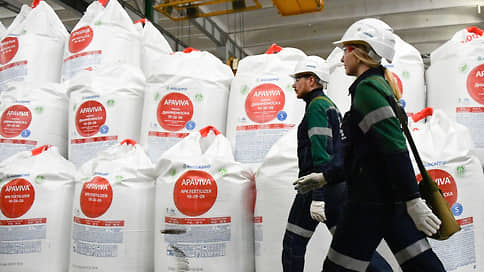Government abandons floating export duty on fertilizers
[ad_1]

The state, not receiving budgeted tax revenues due to falling prices for fertilizers, decided to change the scheme for levying export duties. Instead of a floating rate, which was tied to the price of fertilizer, the rate will be reduced, but will be fixed. According to experts, the change in the formula will affect Phosagro and Eurochem the most.
From September 1, 2023 to December 31, 2024, the government plans to introduce an export duty of 8% for all types of fertilizers. According to the draft resolution prepared by the Ministry of Finance (published on regulation.gov.ru), during the period of this measure, budget revenues will amount to 87 billion rubles.
The single ad valorem rate will replace the current system where the fee was floating.
Thus, if the price of fertilizers was up to $450 per ton, the duty was zero, and if this price was exceeded, a duty of 23.5% was charged on the difference between the market price and the cut-off price of $450 per ton.
The state expected to receive 119 billion rubles in 2023. due to duty. But against the backdrop of changing pricing conditions in the global fertilizer markets and the peculiarities of the marketing policy of mineral fertilizer producers, budget revenues for the first half of the year amounted to only 6 billion rubles, the explanatory note notes.
At the same time, the Ministry of Finance believes that such an “adjustment” to maintain the planned state revenues will not become critical for manufacturers. They refer to the fact that in the first quarter, the EBITDA margin of chemical companies ranged from 48% to 59% (while in the first quarter of 2022 – from 48% to 75%). The amount of withdrawals, according to the calculations of the Ministry of Finance, will average about 10% of operating profit or 15% of free cash flow for 2022. “Given the current profitability of producers, as well as the temporary nature of this measure, the proposed exemptions will not have a significant negative impact on the long-term development of the fertilizer production industry and will maintain sufficient operating profitability for manufacturers to fulfill their plans within the approved investment programs,” the explanatory note says.
But the companies themselves think differently.
Officially, none of the market participants began to comment on the innovations, but sources close to them indicate that during a period of low prices, such a measure will greatly weaken manufacturers.
In addition, Kommersant’s interlocutors note that the amounts of seizures may turn out to be extremely uneven for different companies, taking into account differences in production costs. According to the previous formula, the duty mainly came from the sale of phosphorus and complex fertilizers, since quotations for nitrogen products at the very beginning of the year turned out to be below the cut-off price, and potash supplies abroad decreased significantly.
Experts agree with this opinion. “The new formula, of course, will make life more difficult for fertilizer exporters,” said Dmitry Akishin, managing director of Implementa. “With lower prices for raw materials and products, the supply curve becomes flatter, and the competitive positions of countries that have their own raw materials weaken. The additional duty exacerbates this effect. In addition, due to the need to reorient trade flows for a number of products, our manufacturers are already incurring additional transportation costs.” He also notes that the old and new duties become equal only at a very high price for fertilizers – about $700 per ton. Therefore, in the absence of unforeseen price spikes, the new formula is likely to generate more government revenue over the medium term than the previous one. The expert points out that a similar instrument of export duties on fertilizers exists, for example, in China, the largest player in the fertilizer market. The values and coefficients of duties there change regularly, which allows the country, among other things, to regulate the domestic market.
Independent expert Leonid Khazanov is sure that the introduction of a fixed duty will worsen the financial condition of companies, given how cheaper their products are. Thus, potash in the global market now costs about $320-330 per ton, diammonium phosphate – $445-450 per ton, triple superphosphate – $370-390 per ton. Under such conditions, according to the expert’s calculations, the volume of payments by Acron could amount to 9-10 billion rubles, Phosagro – 30-32 billion rubles, Uralkali – 15-16 billion rubles, Eurochem – 20-10 billion rubles. 24 billion rubles
[ad_2]
Source link





